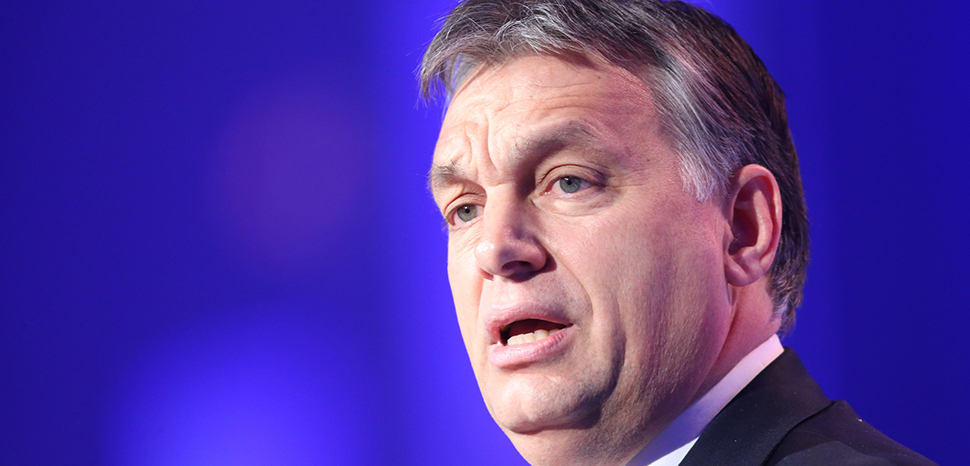Alexander Brotman

2024 is looking to be another year of antagonistic relations between the EU, its member states, and Hungary. This past week, Brussels threatened to take extraordinary steps to harm Hungary’s economy if it chose to veto the bloc’s 50 billion EUR aid package for Ukraine. Budapest ultimately bended, and for the time being Brussels is even ahead of Washington in terms of its solidarity and material support for Ukraine as Russia’s full-scale invasion nears the two-year mark. The past week also revealed the power of both Euro-centric and Eurosceptic forces in working together to advance the priorities of the bloc, with French President Macron and Italian Prime Minister Meloni reportedly playing a pivotal role in swaying Orban to his final position.
At Brussels’ disposal throughout the tense negotiations was the so-called nuclear option of Article 7, which would have suspended Hungary’s voting rights due to a ‘clear risk of a serious breach’ of the EU’s principles. While satisfying to the EU, this antagonistic method risked feeding right into Orban’s hands and further strengthening his domestic position. In a similar vein as the role Turkey’s Recep Tayyip Erdogan plays in NATO, Orban relishes playing the role of kingmaker in EU affairs, leveraging his position to extract maximum concessions from Brussels. Consensus is one of the hallmarks of the European project, and while cohesion may not always be possible for 27 different member states, ostracization can work to inadvertently harm the image of the EU in the minds of Hungarians fighting against Orban’s illiberalism.
There are few easy answers for Brussels in its dealings with Hungary, and there are likely to be further pressure points on the horizon. The EU’s response will also help shape the dialogue around future enlargement that will likely occur to Ukraine, Moldova, and states in the Western Balkans. Furthermore, Orban may have successfully captured Hungarian politics with his illiberal, nationalist message, but that does not necessarily translate into a desire for Hungary to leave the EU should it be put to the voters. The EU should make clear that its issue is not with Hungary and its place in the union, but with Orban and his ability to singlehandedly stifle the progression of the bloc at a time of great geostrategic importance.
The character of Orban is also not unique, and elements of his persona are found in leaders and parties in France, the Netherlands, Slovakia, Italy, and Sweden. A pro-European leader like former Dutch Prime Minister Mark Rutte presiding over a center-right party for over a decade is likely to be the exception and not the norm of European politics. Given the center-left and the center-right have been hollowed out to varying degrees across EU member states, flexibility and adaptability will be key to how Brussels engages with leaders across the political spectrum. Europe is likely to remain politically fragmented and prone to regionalism regardless of how supranational the EU becomes. The conflict in Ukraine has shown both sides of this, with consensus emerging on Ukraine’s accession bid, but protests developing in Poland, Hungary, and Slovakia in favor of their farmers and economic interests over those of Ukraine’s. The EU’s largest economy, Germany, is not immune from this sentiment either, with farmers protests bringing gridlock to Berlin, and the rise of the Alternative for Deutschland party ahead of upcoming elections raising the specter of economic nationalism once again.
Moving forward, Orban is likely to retain his concerns over Ukraine’s treatment of its Hungarian-speaking minority and stay on warm terms with Russian President Vladimir Putin for both energy and ideological needs. The EU’s threat to harm Hungary’s economy if it failed to agree to the Ukraine aid package may have proved successful for now, but ‘Orban fatigue’, as Polish Prime Minister Donald Tusk has proclaimed, is a very real problem for Brussels. The EU has proven remarkably resilient in dealing with multiple crises over the past decades from the financial crisis to the migrant crisis and now the largest land war in Europe since World War II. The EU’s bureaucracy is both its greatest gift and its greatest burden, providing the technocratic measures for states to advance on their path of democratic development, and then the weight of uniformity and the restriction of sovereignty that comes once accession is complete.
Thus far, Orban and the EU continue to share the view that it is better for Hungary to be inside the tent pissing out than outside pissing in, as President Lyndon Johnson famously opined. Orban’s politics will likely continue to be based on grievance and the restoration of national pride, building on the sense of distrust that first emerged after Hungary’s dismemberment in the 1920 Treaty of Trianon. Hungary can still play the roles of spoiler and victim, but the EU must not play the role of aggressive overseer, co-opting Hungary for its own ends. For more harmonious relations to develop, Brussels should view Budapest as a net contributor to a bloc in which Orban’s principles and character are far from unique but rather representative of a perennial undercurrent of the European project.
No comments:
Post a Comment